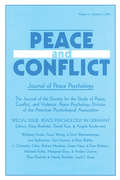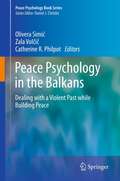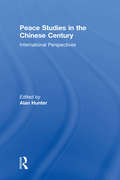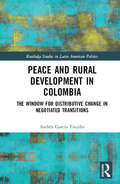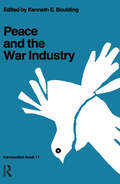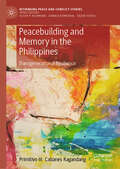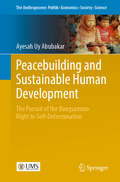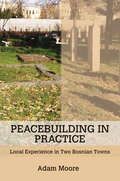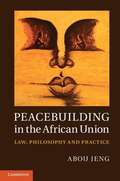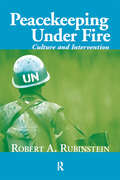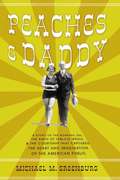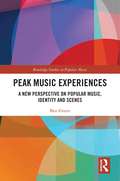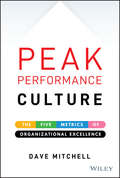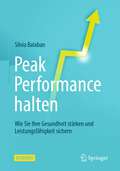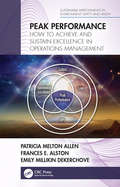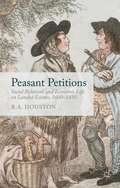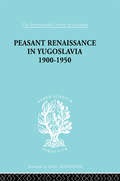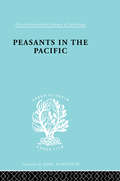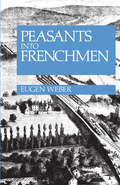- Table View
- List View
Peace Psychology in Australia
by Nikola Balvin Diane BrethertonThis book is a case study of the development of peace psychology in Australia. While there is, in comparison to other countries, relatively little overt violence, Australia the nation was founded on the dispossession of Indigenous people, and their oppression continues today. Peace Psychology in Australia covers the most significant issues of peace and conflict in the country. It begins with a review of conflict resolution practices among Australia's ancient Indigenous cultures and succinctly captures topics of peace and conflict which the country has faced in the past 222 years since British settlement. The fast population growth, thriving multiculturalism, leadership in international affairs and environmental isolation make Australia a microcosm for the study of human conflicts and peace movements.
Peace Psychology in Germany: A Special Issue of Peace and Conflict
by Klaus Boehnke Daniel Fuss Angela KindervaterFirst published in 2005. This is a special issue of Peace and Conflict, the Journal of Peace Psychology, Volume II, number 3 looks at Peace Psychology in Germany. The papers include old and new antisemitic attitudes, human rights, attitudes towards War, refugees, and results from a German Six-Wave, twenty-year study.
Peace Psychology in the Balkans
by Catherine R. Philpot Olivera Simić Zala VolčičThe volume covers the development of peace psychology in the Balkans. The Balkans is a region marked by post-communist and post-conflict transitional turmoil, and this book provides a comprehensive introduction to research in peace psychology in this part of the world, written by scholars primarily working in the Balkan area. It brings together innovative scholarship that examines interdisciplinary aspects of peace psychology researched and written by scholars from Kosovo, Serbia, Bosnia, Bulgaria, Romania, Macedonia, Croatia, and Slovenia as well as presenting research that responds to contemporary global issues by tracking the ways in which peace psychology is developing and implementing in the Balkans.
Peace Studies in the Chinese Century: International Perspectives
by Alan HunterThe rise of China is probably the most significant shift in the international power structure this generation. China's leaders have so far committed themselves to a 'peaceful rising' but serious tensions are inevitable in such a rapid transformation. Dialogue on peace and conflict issues at this juncture is invaluable. This volume focuses on developments in peace research in a number of key countries, and in particular introduces for the first time in English the perspectives of a number of Chinese scholars who have started to engage with peace studies agendas. Comparisons are drawn from the UK, USA, Mexico, Japan and South Africa to provide a better understanding of the debates on a global level and the discussion among different countries. Some of the outstanding peace researchers who contribute to the volume include Andrew Rigby, Johan Galtung - who is generally considered to have founded the discipline in its current form - and Ursula Oswald. The volume is a valuable and unique contribution to the contemporary peace research agenda and will appeal to an interdisciplinary readership in peace studies, sociology, politics, international relations, religious studies, philosophy and Asian studies.
Peace and Rural Development in Colombia: The Window for Distributive Change in Negotiated Transitions (Routledge Studies in Latin American Politics)
by Andrés García TrujilloIn Peace and Rural Development in Colombia Andrés García Trujillo investigates whether peace agreements geared toward terminating internal armed conflicts trigger rural distributive changes. Combining academic rigor with an insider’s perspective, García Trujillo shows that the peace agreement in Colombia opened an exceptional window for addressing rural inequality. Yet, despite some progress, he argues that the agreement’s leverage to stir change was severely constrained by opposing actors within and outside the government. García Trujillo later applies the framework developed for the Colombian case to explain key dynamics of other post-conflict societies that have dealt with agrarian issues under a transitional context, like El Salvador or South Africa. The original theoretical framework and empirically rich analysis make Peace and Rural Development in Colombia an indispensable read for scholars and practitioners who wish to gain an understanding on the political economy of peacemaking, policy change, and rural development in Colombia and beyond.
Peace and the War Industry
by Kenneth E. BouldingMore and more people are demanding an end to violence as a means of arbitrating international demands and resolving problems between nations. This collection of essays brings social scientific evidence to bear on the question of the "inevitability" of war, and evaluates the potential for managing the international system in the interest of peace instead of war. The contributors discuss methods of lowering distrust among^nations; they consider whether war persists because it has become an economic necessity built into a "military-industrial complex."' They deal with implications of expansion of the military into civilian areas such as education, and into increasingly sophisticated technology such as the ABM Safeguard system. They discuss* the involvement of social scientists in the formulation of "peace" and "war" policy.Collectively, these essays present the most serious questions social scientists have been asking about problems of war and peace, and offer hope that the present international system, dangerous and appallingly costly as it is, may offer enough stability to give us time to transform it into something that bettet serves human needs.
Peace at What Price?
by Sarah E. CrocoWhy do some leaders stay in wars they are unlikely to win? Why do other leaders give in to their adversaries' demands when continued fighting is still possible? Peace at What Price? strives to answer these questions by offering a new theoretical concept: leader culpability. Culpable leaders - those who can be credibly linked to the decision to involve the state in the war - face a significantly higher likelihood of domestic punishment if they fail to win a war than non-culpable leaders who do the same. Consequently, culpable leaders will prosecute wars very differently from their non-culpable counterparts. Utilizing a large-N analysis and case illustrations, the book's findings challenge the conventional wisdom regarding the relationship between war outcomes and leader removal and demonstrate the necessity of looking at individual leader attributes, instead of collapsing leaders by regime type. The book also offers new insights on democracies at war and speaks to the American experience in the wars in Iraq and Afghanistan.
Peace, Bugs, and Understanding: An Adventure in Sibling Harmony (Anh's Anger Story)
by Gail Silver Youme Nguy?n LyLily and her little sister Ruby are having a picnic when Ruby spoils their game of checkers. Lily lashes out but soon gets absorbed in a wonderful book, the story of her great grandfather's encounter with a strange looking frog-like creature called Anger. The precious old journal teaches Lily about Metta, a technique that has helped people transform anger into loving kindness for thousands of years.With original watercolors by award-winning illustrator Youme Nguyen Ly, Peace, Bugs, and Understanding is an invaluable tool for parents and teachers, and will help children learn to understand the causes of their own strong emotions, while teaching them peaceful ways to resolve difficulties through mindfulness and meditation. and accepting accountability for their actions when appropriate. By learning these skills, children can grow comfortable with them and carry them into adulthood with ease and confidence.
Peace-Building in Israel and Palestine
by Julia ChaitinThis book presents an overview of psycho-social research on the Israeli-Palestinian conflict, presents and analyzes people-to-people activities in the region, and offers new conceptualizations for Israeli-Palestinian co-creation of a grassroots peace and social justice processes.
Peacebuilding and Memory in the Philippines: Transgenerational Resilience (Rethinking Peace and Conflict Studies)
by Primitivo III RagandangThis book critically examines community resilience within peace and conflict studies. By focusing on the complexities of resilience in the ayóm-ayómic political order in the Philippines, it shows how memories, experiences and intergenerational dialogue shape resilience strategies across time and space. Through theoretical analysis and case studies, the book challenges conventional understandings of resilience by highlighting its complex intersections with agency, resistance, and political survival. It delves into the role of resource scarcity, trauma, and shifting socio-political landscapes in shaping resilience strategies, offering a nuanced perspective beyond its often-romanticized portrayal. By bridging theoretical debates with real-world insights, it provides a fresh framework for understanding resilience as both a political and social process. This book is an essential resource for scholars, practitioners, and policymakers engaged in peacebuilding, governance, and conflict transformation.
Peacebuilding and Sustainable Human Development: The Pursuit of the Bangsamoro Right to Self-Determination (The Anthropocene: Politik—Economics—Society—Science #16)
by Ayesah Uy AbubakarThis book presents the protracted right to self-determination conflict between the Philippine state and the Bangsamoro group in Mindanao, Philippines. In the five decades of attempts to achieve peace, a key element is the Bangsamoros’ search for a kind of development that is compatible with their aspirations for freedom and their future. This book presents a study of the Bangsamoro communities and their social constructions of conflict, peace and development. It examines the viability of the sustainable human development framework for application in their challenging realities. The usefulness of the sustainable human development framework lies not only in its use of human development parameters like the Human Development Index. It also provides an approach towards development that synergizes with the sustainable peace framework – an imperative for Mindanao. At the centre of this approach is the Participatory Rural Appraisal and Participatory Learning and Action methodology for eliciting responses, stimulating discussion, documenting verbal and non-verbal ideas and carrying out small-scale projects to demonstrate community participation. The book concludes with two main points: that (a) both sustainable human development and peacebuilding are mutually reinforcing frameworks aimed at achieving the same human development goals, and (b) the pursuit of the right to self-determination is enhanced, as both frameworks are combined to provide a context for the attainment of peace in Mindanao.
Peacebuilding in Practice: Local Experience in Two Bosnian Towns
by Adam MooreIn November 2007 Adam Moore was conducting fieldwork in Mostar when the southern Bosnian city was rocked by two days of violent clashes between Croat and Bosniak youth. It was not the city’s only experience of ethnic conflict in recent years. Indeed, Mostar’s problems are often cited as emblematic of the failure of international efforts to overcome deep divisions that continue to stymie the postwar peace process in Bosnia. Yet not all of Bosnia has been plagued by such troubles. Mostar remains mired in distrust and division, but the Brcko District in the northeast corner of the country has become a model of what Bosnia could be. Its multiethnic institutions operate well compared to other municipalities, and are broadly supported by those who live there; it also boasts the only fully integrated school system in the country. What accounts for the striking divergence in postwar peacebuilding in these two towns?Moore argues that a conjunction of four factors explains the contrast in outcomes in Mostar and Brcko: The design of political institutions, the sequencing of political and economic reforms, local and regional legacies from the war, and the practice and organization of international peacebuilding efforts in the two towns. Differences in the latter, in particular, have profoundly shaped relations between local political elites and international officials. Through a grounded analysis of localized peacebuilding dynamics in these two cities Moore generates a powerful argument concerning the need to rethink how peacebuilding is done—that is, a shift in the habitus or culture that governs international peacebuilding activities and priorities today.
Peacebuilding in the African Union
by Abou JengParticularly in the context of internal conflicts, international law is frequently unable to create and sustain frameworks for peace in Africa. In Peacebuilding in the African Union, Abou Jeng explores the factors which have prevented such steps forward in the interaction between the international legal order and postcolonial Africa. In the first work of its kind, Jeng considers whether these limitations necessitate recasting the existing conceptual structure and whether the Constitutive Act of the African Union provides exactly this opportunity through its integrated peace and security framework. Through the case studies of Burundi and Somalia, Jeng examines the structures and philosophy of the African Union and assesses the capacity of its practices in peacemaking. In so doing, this book will be of great practical value to scholars and legal practitioners alike.
Peaceful Families: American Muslim Efforts against Domestic Violence
by Professor Juliane HammerAn in-depth look at how Muslim American organizations address domestic violence within their communitiesIn Peaceful Families, Juliane Hammer chronicles and examines the efforts, stories, arguments, and strategies of individuals and organizations doing Muslim anti–domestic violence work in the United States. Looking at connections among ethical practices, gender norms, and religious interpretation, Hammer demonstrates how Muslim advocates mobilize a rich religious tradition in community efforts against domestic violence, and identify religion and culture as resources or roadblocks to prevent harm and to restore family peace.Drawing on her interviews with Muslim advocates, service providers, and religious leaders, Hammer paints a vivid picture of the challenges such advocacy work encounters. The insecurities of American Muslim communities facing intolerance and Islamophobia lead to additional challenges in acknowledging and confronting problems of spousal abuse, and Hammer reveals how Muslim anti–domestic violence workers combine the methods of the mainstream secular anti–domestic violence movement with Muslim perspectives and interpretations. Identifying a range of Muslim anti–domestic violence approaches, Hammer argues that at certain times and in certain situations it may be imperative to combat domestic abuse by endorsing notions of “protective patriarchy”—even though service providers may hold feminist views critical of patriarchal assumptions. Hammer links Muslim advocacy efforts to the larger domestic violence crisis in the United States, and shows how, through extensive family and community networks, advocates participate in and further debates about family, gender, and marriage in global Muslim communities.Highlighting the place of Islam as an American religion, Peaceful Families delves into the efforts made by Muslim Americans against domestic violence and the ways this refashions the society at large.
Peacekeeping Under Fire: Culture and Intervention
by Robert A. RubinsteinThe international community increasingly responds to civil wars, humanitarian crises, and other intrastate conflicts through the instrument of UN peacekeeping. Nearly all of these interventions take place in non-Western areas and involve interactions among militaries and nongovernmental organizations from all around the globe. In this wide-ranging book, Rubinstein draws on decades of his own research on peacekeeping, and on other current and historical cases, to develop a broad understanding of the roles that culture plays in peacekeeping's success or failure. Peacekeeping under Fire shows that cultural considerations are key elements at all levels of peacekeeping operations. Culture influences what happens between peacekeepers and local populations, how military and nongovernmental organizations interact, and even how missions are planned and authorized. Peacekeeping under Fire analyzes how political symbolism and ritual are critical to peacekeeping and demonstrates how questions of power, identity, and political perception emerge from the cultural context of peacekeeping.
Peaches and Daddy: A Story of the Roaring Twenties, the Birth of Tabloid Media, and the Courtship That Captured the Heart and Imagination of the American Public
by Michael M. Greenburg"Peaches & Daddy" vividly recounts the amazing and improbable 1926 marriage and legal battle between a 51-year-old Manhattan millionaire and a 15-year-old girl. Their story captured the imagination of the American public and gave birth to tabloid journalism.
Peak Music Experiences: A New Perspective on Popular music, Identity and Scenes (Routledge Studies in Popular Music)
by Ben GreenPeak music experiences are a recurring feature of popular music journalism, biography and fan culture, where they are often credited as pivotal in people’s relationships with music and in their lives more generally. Ben Green investigates the phenomenon from a social and cultural perspective, including discussions of peak music experiences as sources of inspiration and influence; as a core motivation for ongoing musical and social activity; the significance of live music experiences; and the key role of peak music experiences in defining and perpetuating music scenes. The book draws from both global media analysis and situated ethnographic research in the dance, hip hop, indie and rock ‘n’ roll music scenes of Brisbane, Australia, including participant observation and in-depth interviews. These case studies demonstrate the methodological value of peak music experiences as a lens through which to understand individual and collective musical life. The theoretical analysis is interwoven with selected interview data, illuminating the profound and everyday ways that music informs people’s lives. The book will therefore be of interest to the interdisciplinary field of popular music studies as well as sociology and cultural studies beyond the study of music.
Peak Performance Culture: The Five Metrics of Organizational Excellence
by Dave MitchellAn innovative approach to driving maximum performance at all levels of an organization Peak Performance Culture: The Five Metrics of Operational Excellence is a step-by-step roadmap to achieving optimal organizational development in your company or association. This practical guide helps you accurately evaluate the current state of your company and create a strategy that maximizes its future success. Author Dave Mitchell, building upon concepts introduced in his bestselling books The Power of Understanding People and The Power of Understanding, provides new applications, effective real-world tactics, powerful organizational assessment tools, and much more. The book addresses the five critical factors for organizational success: vertical alignment, horizontal alignment, leadership ideology and corporate culture, employee experience, and customer experience. Each comprehensive chapter introduces a key component to peak performance culture — containing a detailed definition of the component, illustrative examples, expert insights, and practical considerations relevant to a diverse range of real-world situations. This must-have guide: Features exercises and assessments to identify organizational metrics drawn from 25 years of work with client organizations such as Allstate Insurance, Bank of America, Universal Studios, Hilton Worldwide, Walt Disney World, and hundreds more Explores best practices for implementing policies, procedures, and philosophies that align with an organization's mission, values, and strategy Discusses individual characteristics of high performers, how to enhance teamwork, the relationships between functional units within an organization, and employee recruitment, selection, and onboarding Addresses issues surrounding how employees responsible for customer satisfaction are experiencing their organizations Provides tools for continually evaluating and improving customer experience, including a pragmatic model that can be applied to any organization Whether your company needs to correct performance problems, or is already successful but seeking even higher levels of success, Peak Performance Culture: The Five Metrics of Operational Excellence will prove to be an invaluable resource for any organization.
Peak Performance halten: Wie Sie Ihre Gesundheit stärken und Leistungsfähigkeit sichern
by Silvia BalabanAls Leistungsträger liefern Sie 24/7 mentale Höchstleistung: zunehmende Arbeitsverdichtung, Entscheidungsdauerfeuer und ASAP-isierung gekoppelt mit ständiger Erreichbarkeit und den Folgen von Globalisierung, sowie wirtschaftlichen und politischen Krisen. All das zehrt an Ihrer Energie. All das geht auf Kosten Ihrer Gesundheit. Um ein Auspowern zu vermeiden, ist ein wirkungsvolles, wissenschaftlich fundiertes Trainings- und Regenerationskonzept erforderlich, wie es im Leistungssport seit Jahren Standard ist. Daher bilden neueste Methoden und objektiv messbare Daten aus der Stressmedizin die Basis dieses Buches. Erfahren Sie, wie Sie durch biochemische und biophysische Parameter Ihre Kraft und Regeneration qualitativ verbessern können, denn Fakten schaffen Sicherheit. Praxisnah und leicht verständlich informiert dieser Ratgeber mit Selbstchecks, Fallbeispielen und Praxistipps über die wichtigsten Gesundheitsgrundlagen für berufliche Peak Performance Situationen. Fundiertes Wissen, damit Sie neue Stärke tanken und zukünftige Herausforderungen wieder mit Gelassenheit meistern können.
Peak Performance: How to Achieve and Sustain Excellence in Operations Management (Sustainable Improvements in Environment Safety and Health)
by Patricia Melton Allen Frances E. Alston Emily Millikin DeKerchoveThe key to success and reaching peak performance is integrating three processes to optimize business through the use of human performance improvement tools, lean thinking, operational excellence, along with a strong organizational culture as the underpinning. These components form the basis of the Peak Performance Model. The tools presented in this book, along with the case studies, demonstrate how the model is applied and integrated into company practices. Companies and organizations want to improve their performance, but many have not integrated the right tools and processes. Through the application of the Peak Performance Model, every company can achieve and sustain Peak Performance.
Peasant Petitions
by R. A. HoustonThis book examines the structures and texture of rural social relationships, using one type of document found in abundance over all the four component parts of Britain and Ireland: petitions from tenants to their landlords. The book offers unexpected angles on many aspects of society and economy on estates in the 17th and 18th centuries.
Peasant Renaissance in Yugoslavia 1900 -1950: A Study of Development of Yugoslavia as Affected by Education (International Library of Sociology)
by Ruth TroutonThis is Volume VIII of nine in a series on Historical Sociology. Originally published in 1952, this is a study of Development of Yugoslav Peasant society as affected by education during 1900 to 1950.
Peasant Violence and Antisemitism in Early Twentieth-Century Eastern Europe
by Irina MarinThis book is a transnational study of rural and anti-Semitic violence around the triple frontier between Austria-Hungary, Romania and Tsarist Russia at the beginning of the twentieth century. It focuses on the devastating Romanian peasant uprising in 1907 and traces the reverberations of the crisis across the triple frontier, analysing the fears, spectres and knee-jerk reactions it triggered in the borderlands of Austria-Hungary and Tsarist Russia. The uprising came close on the heels of the 1905-1907 social turmoil in Tsarist Russia, and brought into play the major issues that characterized social and political life in the region at the time: rural poverty, the Jewish Question, state modernization, and social upheavals. The book comparatively explores the causes and mechanisms of violence propagation, the function of rumour in the spread of the uprising, land reforms and their legal underpinnings, the policing capabilities of the borderlands around the triple frontier, as well as newspaper coverage and diplomatic reactions.
Peasants In Pacific Ils 67: A Study Of Fiji Indian Rural Society (International Library of Sociology)
by Adrian C MayerFirst published in 1998. Routledge is an imprint of Taylor & Francis, an informa company.
Peasants Into Frenchmen: The Modernization of Rural France, 1870-1914
by Eugen WeberFrance achieved national unity much later than is commonly supposed. For a hundred years and more after the Revolution, millions of peasants lived on as if in a timeless world, their existence little different from that of the generations before them. The author of this lively, often witty, and always provocative work traces how France underwent a veritable crisis of civilization in the early years of the French Republic as traditional attitudes and practices crumbled under the forces of modernization. Local roads and railways were the decisive factors, bringing hitherto remote and inaccessible regions into easy contact with markets and major centers of the modern world. The products of industry rendered many peasant skills useless, and the expanding school system taught not only the language of the dominant culture but its values as well, among them patriotism. By 1914, France had finally become La Patrie in fact as it had so long been in name.

